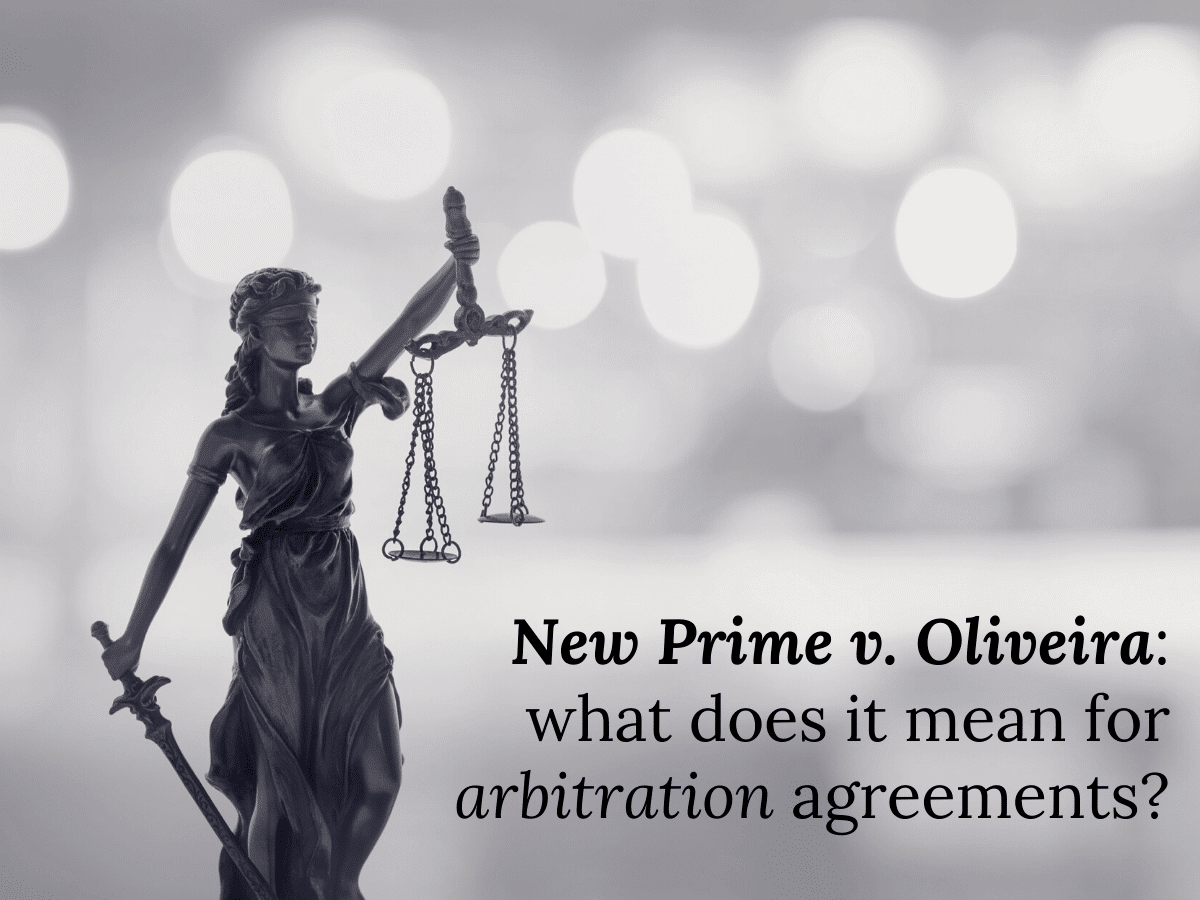New Prime v. Oliveira: What Does It Mean For Arbitration Agreements?
On January 15, 2019 the United States Supreme Court released its decision in New Prime v. Oliveira, and for what was likely the first time in almost two decades, the Court did not enforce an arbitration agreement. In its unanimous decision, the Supreme Court expanded the reach of the Federal Arbitration Act’s section 1 exceptions, allowing a bigger group of individuals to circumvent their arbitration agreements and bring their claims directly to court.
So, what does this case mean for business owners and employees? Arbitration around Phoenix is a popular legal topic, especially when it comes to employment agreements and disputes. Does this new case render arbitration agreements worthless? Do employees suddenly have the upper hand when it comes to their arbitration agreements? This article will fill you in on everything you need to know about this decision, whether you are an employer or an employee.

Background: the FAA and New Prime
The New Prime case has to do with the Federal Arbitration Act (“FAA”), which enforces contractual arbitration provisions. Most commonly, and relevant here, this includes arbitration clauses found in employment agreements, which are widespread today. In New Prime, Mr. Oliveira was hired by New Prime as a truck driver. Initially, Mr. Oliveira was hired as an independent contractor, and signed an employment agreement with New Prime that stated that in the event of a dispute between them, the matter would go to arbitration instead of going to court. Additionally, the agreement held that an arbitrator, not a court, would determine whether potential disputes could be arbitrated. During his employment with New Prime, Mr. Oliveira was regularly paid in such a way that he was not receiving the minimum wage required by law, and so he brought suit against New Prime in a class action lawsuit. New Prime brought up the arbitration provision in the employment agreement, saying the case needed to be taken out of court and arbitrated. Mr. Oliveira pointed to section 1 of the FAA, which exempts “transportation employees” involved in interstate commerce. New Prime countered that Mr. Oliveira was an independent contractor, not an employee. However, New Prime argued that pursuant to their agreement, an arbitrator should decide whether the issue was subject to arbitration, and whether section 1 of the FAA applied. These two issues made their way to the Supreme Court, where the Court held that the language of the FAA indicated that independent contractors as well as employees could be considered “transportation workers,” and therefore exempt from the arbitration requirements of the FAA. The Court also held that a court, not an arbitrator, should decide whether section 1 of the FAA applied, regardless of any arbitration agreement, because if section 1 applied in the first place, those workers were exempt from arbitration, even to determine whether arbitration was appropriate.
When the decision was handed down by the Court, some commentators discussed the possibility that this case would be a basis for allowing massive amounts of employees to be exempted from compulsory arbitration under FAA section 1. They pointed to Justice Ginsberg, who had agreed with the decision but also filed a concurring opinion in which she stated that the policy goals of the FAA were to exclude a much wider group of employees from compulsory arbitration agreements, even if the text of the statute was less clear. This was not the first time that Justice Ginsberg had voiced this opinion, and legal commentators have commented that New Prime might be the case to begin exempting more and more employees from arbitration agreements.
What New Prime does and what it does not do
New Prime does expand the section 1 exceptions of the FAA. It does not, however, expand them as far as many might have feared. New Prime in no way changed or overruled the class of workers, “transportation workers,” that are excluded under FAA section 1. Workers need to be “transportation workers” engaged in interstate commerce to be exempted from arbitration requirements under the FAA.
New Prime does, however, expand FAA section 1 exceptions to independent contractors who are transportation workers engaged in interstate commerce. Under the case, the modern technical differences between an employee and an independent contractor do not matter when it comes to determining whether a worker is exempt under FAA section 1. This means that many more people will be exempt from FAA arbitration requirements. However, this will be limited to industries involved in interstate transportation only and will not affect all industries involved in interstate commerce, which would be essentially every modern American business.
What does it mean for you or your business?
The reality is, unless you are working in the interstate transportation industry, New Prime probably is not a huge deal for you. The decision is an important one from the Supreme Court and could be an indication of future changes in arbitration jurisprudence, but all of that is speculation. Concretely, New Prime will impact only businesses and workers involved in interstate transportation.
If you do happen to be a business owner or employer working in the interstate transportation industry, you do need to be aware of this case and its implications. Prior to New Prime, workers could be employed as independent contractors to keep them out of the FAA section 1 exception. Now, those workers’ status as independent contractors will be considered equivalent to an employees’ exempt status. Therefore, all of your workers, regardless of technical status as independent contractor or employee, will have the option to avoid any potential arbitration agreements and bring their claims directly to court. This is something you need to be aware of as a business owner, especially if you have relied heavily on arbitration in the past. Although arbitration may still be an option if workers are willing to arbitrate, following New Prime those workers have the right to bring their claims to court and avoid arbitration if they so choose.
If, on the other hand, you are employed in the interstate transportation industry as an independent contractor or other worker, New Prime means that you may no longer be bound by any arbitration agreements you may have entered into with your employer. If you have claims you may want to bring to court, New Prime now allows you to do so and avoid arbitration. Now that the FAA section 1 exceptions extend to you, you cannot be bound to compulsory arbitration and may bring claims against your employer directly in court, including through a class action suit.
Conclusion
New Prime is undoubtedly a big Supreme Court case, and has a very real and significant impact, but only for a limited range of businesses and individuals in America. For those businesses and individuals working in interstate transportation, this case will certainly cause significant changes in the way disputes between employers and workers are resolved. By extending the FAA’s section 1 exceptions to a wider class of transportation workers, arbitration will no longer monopolize dispute resolution, and workers will be better able to bring claims against their employers in court.
Since New Prime is such a new case, however, it is difficult to know exactly the impact it will have on businesses and workers. Skilled business attorneys with experience dealing with arbitration matters can assist you in navigating this new arbitration framework, whether you are a business owner or an employee. The attorneys at Denton Peterson Dunn, PLLC have been handling business and arbitration matters for decades, and have the experience and skill needed to make sure you are protected under the law.

Brad Denton – Denton Peterson, PC
1930 N Arboleda #200
Mesa, AZ 85213
Office: 480-325-9900
Email: [email protected]
Website: https://arizonabusinesslawyeraz.com/